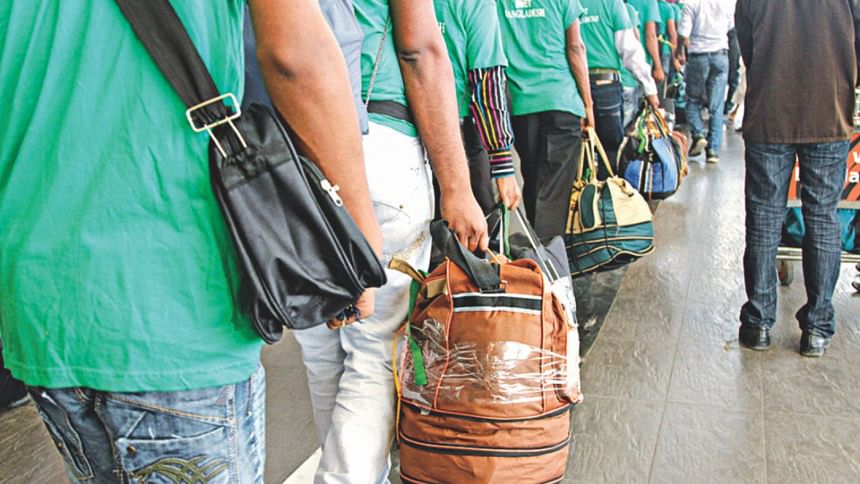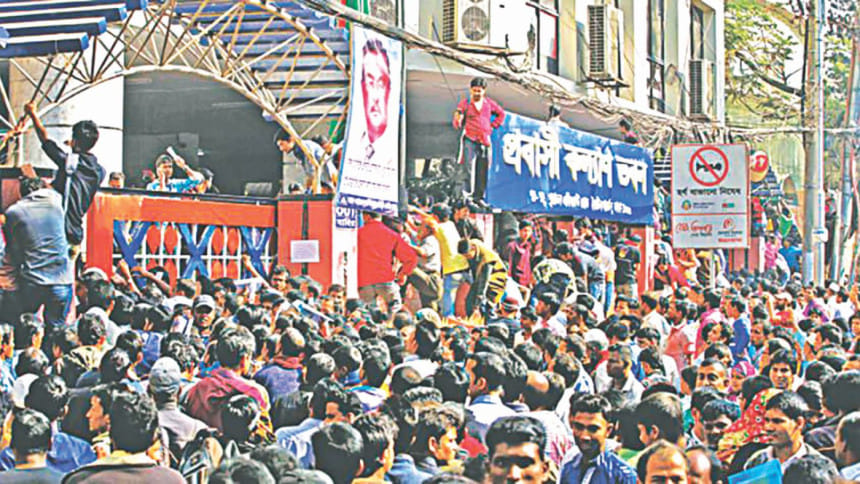Making migrants' life easier

Time and again the government of Bangladesh has reiterated its commitment to ensure the dignity and protection of short-term contract migrant workers. Recognising their contribution to the national economy successive governments in Bangladesh have undertaken a series of legislative and institutional measures. The setting up of the Wage Earners' Welfare Fund (1990), creation of the Ministry of Expatriates' Welfare and Overseas Employment (EWOE) (2001), framing of the National Migration Policy (2006) and the Overseas Employment and Migrants Act (2013), ratification of the 1990 UN Convention on Migrant Workers and Members of their Families (2011) and the establishment of Migrants' Welfare Bank (2011) are important milestones in the government's efforts.
While all the above initiatives and several others have undeniably resulted in extending improved services, Bangladeshi migrants still endure hardship and uncertainty at every stage of their migration process—before migration, in the countries of destination, and upon return. Therefore, significantly more needs to be done for migrants as well as members of their families. It is in this context that a few measures are proposed for consideration of the policymakers.
Rendering quality and effective services requires adequately trained and motivated personnel. Migrants are no inert commodities. Their service providers need to appreciate and understand that individuals, irrespective of their educational and economic status, deserve respect and empathy from those who provide them services. Various surveys and studies have noted that a major complaint of Bangladeshi migrants pertains to quality of services they receive from official agencies both at home and abroad. While efforts are underway in streamlining one-stop services at the Bureau of Manpower Employment and Training (BMET)—the line agency of the government—a lot still needs to be done in this regard.
Evidence is replete that securing information about regular channels of migration is a major challenge that aspirant migrants face. Absence of services of recruiting agencies at the grassroots makes the function of the District Employment and Manpower Office (DEMO) particularly important. The Technical Training Centres (TTCs) are important institutions to impart skills to aspirant migrants and others. BMET performs a range of functions including issuance of licenses and monitoring of recruitment agencies. The bureau is also responsible for giving final clearance to the migrants after ensuring the veracity of the documentation provided. These institutions have permanent staff but scope for their upward mobility in career terms is rather limited. They gain important experience and insight while serving migrants for long periods of time. The absence of incentives to move forward career-wise coupled with the absence of refreshers' courses and higher training often stunt their urge to better serve the migrants.
The setting up of a separate ministry, the Ministry of Expatriates' Welfare and Overseas Employment, to look after the interests of migrants was forward-looking. The ministry plays an important role to fulfil the government's commitments in upholding migrants' interests and in rendering services. Since its inception as the volume of migrants grew new wings have been established at the ministry. Quite justifiably, recognising the importance of labour migration for the national economy, various international agencies, particularly the Swiss Agency for Development and Cooperation, supported and continue to support a number of initiatives of the ministry. An important element of such effort was capacity building of officials of the ministry and its related agencies. However, one of the major problems faced is posting experienced officials to other ministries. This results in loss of capacity and institutional memory that officials gain during the period of his or her tenure at the ministry.
Labour attachés are frontline functionaries in pursuing the interests of migrants in the countries of destination. They act as a bridge between migrants and the authorities of those countries and are the last recourse of migrants who are wronged by the employers, recruiting agencies or state officials. Performing the role of labour attaché requires a great deal of understanding of local customs, work ethics, administrative structures, legal system, etc. It also entails the ability to listen to grievances of individuals and prudently act on them, often trekking a delicate line in dealing with authorities in the host country. Thus, working with vulnerable workers in countries that do not necessarily adhere to international labour standards and that have labour laws biased against the foreign nationals poses to be an unenviable and challenging task. Such conditions necessitate appointment of labour attachés who have the field experience in dealing with people and also have the aptitude to cope in an alien environment.
Unfortunately, the current system of recruitment of labour attachés does not take into account such reality. While most posts are open for competition from civil servants from various services including posts and telegraph and audit and accounts, some are reserved for members of the armed forces. In such cases, lack of prior experience on labour issues works as a hindrance. The current system of recruitment requires a thorough re-thinking. The Sri Lankan and Filipino models of prior work experience for a stipulated period with designated government agencies dealing with workers as a pre-requisite for appointment as labour attaché merit active consideration.
It is in this overall context that there is a strong case for creating a separate cadre for those employed in serving the migrants. In other words, those currently staffing the DEMOs, TTCs, BMET, offices of the labour attachés, the Wage Earners' Welfare Board (WEWB) and the Ministry of EWOE can be brought under a separate cadre. Such restructuring of labour migration governance will have a number of positive effects.

Firstly, it will help retain much desired experience of government functionaries that is often lost due to posting to other ministries. Secondly, it will also help yield higher return on investment on capacity building of officials as they would continue to remain engaged with labour migration issues in their new posts. Thirdly, it will act as a career progress opportunity for those serving in TTCs, DEMOs and WEWB and this will act as an incentive to upgrade their skills and knowledge. Fourthly, long-drawn involvement in labour migration will create conditions for perceptive and intelligent officials to have in-depth knowledge about the problems facing the sector and also their likely solutions.
And finally, in this competitive international labour market, with a diverse range of negotiations that are ongoing at regional (Abu Dhaka Dialogue and Colombo Process) and international platforms (Global Forum on Migration and Development and Global Compact on Migration), surely there is a need for developing capacity within the Ministry of EWOE to effectively and fruitfully engage in such exercises. This necessitates honing in and continuity of expertise. Time has come for the Ministry of EWOE to be an informed participant in those important regional and global conversations that have so far been the sole preserve of the Ministry of Foreign Affairs.
It is worthwhile to note that at a public hearing the Parliamentary Standing Committee on Expatriates' Welfare and Overseas Employment of the 9th Parliament unanimously adopted a resolution endorsing RMMRU's proposal for creating a specialised cadre service along the lines suggested above. The resolution needs to be acted upon.
In this information age accurate and credible data is important for policymaking. Unfortunately, there is a paucity of data on migration in Bangladesh. Although the BMET has been systematically preserving data on outbound migrant workers (countries of destination, skill level, medium of recruitment, etc.) and the Bangladesh Bank on remittance flows, there is a palpable need for data on several other issues. Included among those are: number of times a migrant goes overseas, amount of money spent, the rate of flow of returnee migrants, skills acquired at destination and level of such skills, level and sources of support if any on return, the rate of completion of contract period, reasons for non-completion of contract and the like. Gender, age, skill and geographical location segregated data will be immensely important for appropriate policymaking.
Studies have noted that there is a major gap in framing policies on returnee migrants. This contributes to lack of effective programmes for reintegration of those who return. Low-skilled migrants many a time come back with higher skills that are often in demand domestically. However, absence of a database precludes the
employers from hiring appropriately skilled workers. In addition, data will also help programmes for extending credit and imparting financial literacy, training and business advisory services that migrants often need while setting up their own enterprises on return.
Recognising the importance of the issue Bangladesh has included migration in the Civil Registration and Vital Statistics initiative. There is also the need for including key migration-related information in the national census conducted by the Bangladesh Bureau of Statistics. The Bangladesh Household Remittance Survey 2009 by IOM, and SDC and RMMRU survey on Impact of Migration on Poverty and Development (2014) provide important data on concerned areas. In order to gain longitudinal perspective on impact of migration on the same households the SDC and RMMRU are currently conducting the second round of survey to generate a panel data.
Such open data sources are an important beginning for a robust database on migration in Bangladesh. Future state efforts to generate and collate data on migration should be cognisant of appropriate contents as well as have clear guidelines about sharing and storage. A well-devised data gathering and storage strategy ensuring interoperable application centrally coordinated by a mandated and competent agency such as the BBS merits due consideration. Perhaps there is a lesson to learn from the good practice of collaboration of various ministries with the Department of Census and Statistics of the Government of Sri Lanka in this regard.
In 2011 the Probashi Kallyan Bank was established to extend migration loans to outbound unemployed youth, support returnee migrants in their reintegration effort through loans and encourage expatriate Bangladeshis to invest in Bangladesh. Until October 2017 through its 54 branches the bank has disbursed Tk 250 crore among 25,374 migrants. Its performance in disbursing loan among returnee migrants though has been poor. Over the years only around 160 people have secured such loans. There has not been any assessment about its achievement in encouraging investment of expatriate Bangladeshis.
During its inception 95 percent of the capital of Tk 100 crore of the bank was sourced from the Wage Earners' Welfare Fund. In early November 2017 an inter-ministerial meeting decided that WEWF would provide an additional sum of Tk 235 crore to the bank while the finance division would provide Tk 15 crore. Experts have noted that as the government has taken the move to turn the bank into a regular commercial bank onus lies on it to mobilise the required funds from its own resources. They further call for an evaluation of PKB performance by an independent commission.
Realising the significant contribution of labour migrants to their communities and the national economy successive governments in Bangladesh have set up necessary institutional frameworks to make labour migration process safe and efficient. With fresh challenges facing the sector there is an urgent need for reflection on past efforts. While successes of those initiatives should be celebrated and augmented, rational policymaking demands amendment of imperfect measures. It is hoped that concerned authorities will take cognisance of some of the issues raised in this commentary.
CR Abrar teaches international relations at the University of Dhaka.

 For all latest news, follow The Daily Star's Google News channel.
For all latest news, follow The Daily Star's Google News channel. 



Comments